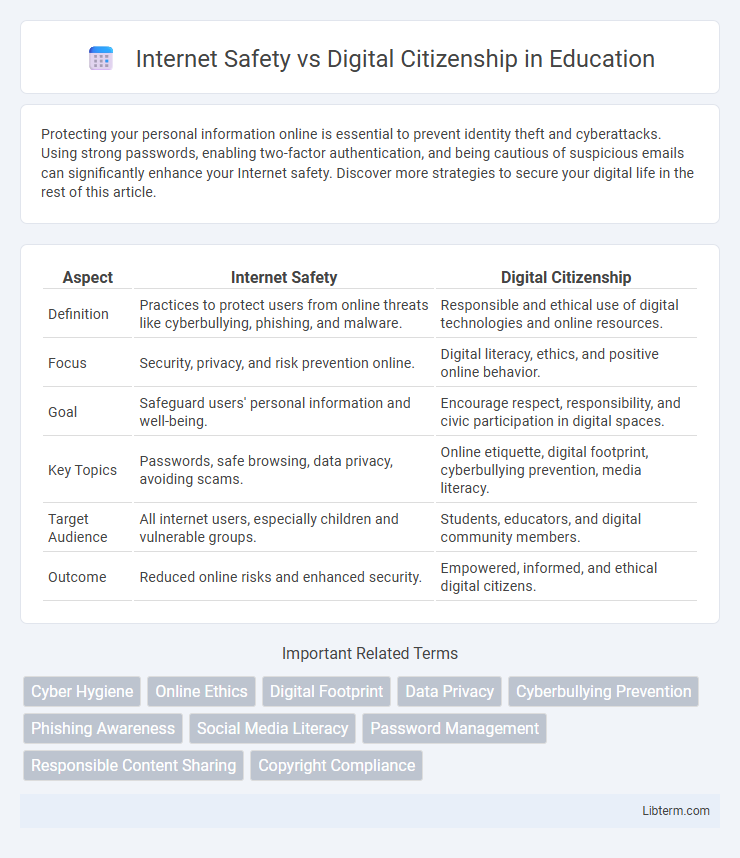Protecting your personal information online is essential to prevent identity theft and cyberattacks. Using strong passwords, enabling two-factor authentication, and being cautious of suspicious emails can significantly enhance your Internet safety. Discover more strategies to secure your digital life in the rest of this article.
Table of Comparison
| Aspect | Internet Safety | Digital Citizenship |
|---|---|---|
| Definition | Practices to protect users from online threats like cyberbullying, phishing, and malware. | Responsible and ethical use of digital technologies and online resources. |
| Focus | Security, privacy, and risk prevention online. | Digital literacy, ethics, and positive online behavior. |
| Goal | Safeguard users' personal information and well-being. | Encourage respect, responsibility, and civic participation in digital spaces. |
| Key Topics | Passwords, safe browsing, data privacy, avoiding scams. | Online etiquette, digital footprint, cyberbullying prevention, media literacy. |
| Target Audience | All internet users, especially children and vulnerable groups. | Students, educators, and digital community members. |
| Outcome | Reduced online risks and enhanced security. | Empowered, informed, and ethical digital citizens. |
Understanding Internet Safety: Key Principles
Understanding Internet Safety involves protecting personal information, recognizing online threats such as phishing and malware, and practicing secure password management to prevent unauthorized access. Key principles include maintaining privacy settings, avoiding suspicious links, and being aware of digital footprints to reduce exposure to cyberbullying and identity theft. Emphasizing safe online behavior ensures a secure and positive digital experience in today's interconnected world.
What is Digital Citizenship?
Digital citizenship encompasses the responsible and ethical use of technology by individuals in a digital environment, emphasizing online etiquette, digital literacy, and understanding the impact of one's digital footprint. It involves actively participating in online communities while respecting others' rights, practicing safe behavior, and protecting personal information. Unlike internet safety, which primarily focuses on protecting users from online threats, digital citizenship promotes positive, informed, and respectful interactions in digital spaces.
Internet Safety vs Digital Citizenship: Defining the Differences
Internet safety emphasizes protecting users from online threats such as cyberbullying, phishing, and malware by promoting secure passwords and privacy settings. Digital citizenship involves responsible behavior and ethical use of technology, including respecting others' rights and understanding digital footprints. Understanding the differences helps individuals not only stay safe online but also engage positively and responsibly in digital communities.
The Importance of Online Privacy
Online privacy is a critical aspect of internet safety and digital citizenship, as it protects individuals from identity theft, data breaches, and unauthorized surveillance. Emphasizing secure password practices, encryption, and cautious sharing of personal information helps maintain control over one's digital footprint. Understanding privacy settings on social media platforms and recognizing phishing attempts empower users to safeguard their sensitive data effectively.
Building Respectful Online Communities
Building respectful online communities involves promoting digital citizenship by encouraging responsible behavior, empathy, and constructive communication among internet users. Internet safety measures protect individuals from cyberbullying, harassment, and privacy breaches, fostering a secure environment where respectful interactions can thrive. Emphasizing both digital citizenship and internet safety creates a foundation for positive, inclusive, and supportive online communities.
Cyberbullying: Prevention and Response
Cyberbullying prevention hinges on fostering digital citizenship by educating users on respectful online behavior and empathy. Implementing robust reporting mechanisms and privacy controls empowers individuals to respond effectively to cyberbullying incidents. Schools and organizations must integrate comprehensive digital literacy programs that highlight the legal and emotional consequences of cyberbullying to create safer online environments.
Digital Footprint Management
Digital footprint management plays a crucial role in digital citizenship by encouraging responsible online behavior and awareness of personal data visibility. Effective management involves understanding how digital actions impact reputation, privacy, and security across social media, websites, and communication platforms. Emphasizing proper digital footprint handling promotes long-term online identity protection and helps prevent data misuse or cyber threats.
Safe Social Media Practices
Safe social media practices emphasize protecting personal information by using strong passwords, enabling privacy settings, and being cautious about sharing location or sensitive details. Digital citizenship involves understanding online etiquette, respecting others' opinions, and recognizing the impact of digital footprints on reputation and future opportunities. Teaching users to critically evaluate content and avoid engaging in harmful behaviors promotes both internet safety and responsible digital citizenship.
Promoting Ethical Online Behavior
Promoting ethical online behavior involves understanding the principles of digital citizenship, including respecting others' privacy, avoiding cyberbullying, and sharing accurate information responsibly. Internet safety addresses protecting personal data and recognizing online threats like phishing, malware, and scams. Together, these practices foster a secure and respectful digital environment essential for positive online interactions.
Educating Youth on Internet Safety and Digital Citizenship
Educating youth on internet safety and digital citizenship involves teaching essential skills like recognizing cyber threats, protecting personal information, and understanding ethical online behavior. Effective programs emphasize critical thinking, responsible communication, and the consequences of digital footprints to foster safer and more respectful online communities. Integrating these topics into school curricula equips young people with the knowledge to navigate digital environments confidently and securely.
Internet Safety Infographic

 libterm.com
libterm.com